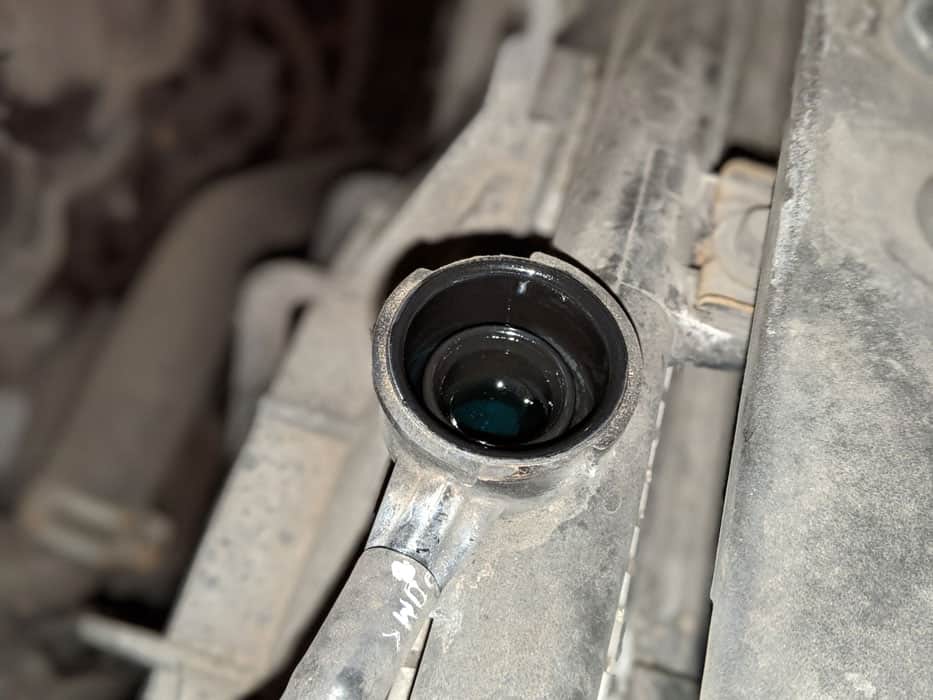Table of Contents
Oil In Your Coolant? What To Check If You Find
Finding out that you have oil in your coolant can wind up with you having a really bad day. This article will go over the common causes of engine oil in coolant and what you should do if you find oil in your coolant. There are a few different causes of oil getting into your vehicle’s coolant reservoir which I will explore in this article. Hopefully, for the sake of your pocketbook it is a simple fix and not a major problem.
How to tell if you have oil in your coolant
When you remove your radiator cap on your vehicle you should be able to see the color of your engine coolant in your radiator, you may be able to see some residual coolant on the underside of the radiator cap. Most engine coolant is going to be green in color, but some can be orange or yellow.
If you open up your radiator cap to find a milky like substance or coolant that is brown in color then it is likely that oil is getting into your coolant system somehow.
The differences between oil and coolant
Most people will know what the purpose of oil and coolant are in your vehicle but if you do not this section will explain the differences between the two.
The Purpose of Oil
Oil is a liquid lubricant that flows through your engine during use to lubricate all of the moving parts of your engine to keep the friction between the metal parts at a minimum level. If you did not have oil in your engine the metal pistons and cylinders would rub together causing friction and start wearing down the parts of your engine at an accelerated pace.
Once your pistons and your cylinders get worn down your engine is not going to run as efficiently and it can start to cause excess blow by in your engine which can lead to more carbon buildup in your air intake.
The Purpose of Coolant
Coolant or antifreeze is a liquid that flows through the block of your engine to help keep it cool and prevent your engine from overheating. If you were running low on coolant or did not have any coolant in your coolant reservoir your engine would start to overheat which can cause your engine to not run as well and can lead it to lock up effectively ruining your engine. That is why it is important that you always have sufficient levels of coolant in your coolant reservoir at all times.
You can use water in your coolant system for a short period in a pinch and it would work in the warmer months of the year but you would want to make sure that you have antifreeze in your coolant system to prevent the water from freezing in the colder months. If you did not have a sufficient mix of antifreeze and water (usually a 50/50 mix) then the water could freeze in your coolant system which can lead to breaking your coolant reservoir, radiator, or even cracking the block of your engine.
Causes of oil getting into your coolant
Leaky Head Gasket
Your engine head gasket is a gasket that is put on your engine block that is designed to seal the engine block to your engine cylinder head so that oil and coolant do not leak out of the engine.
When vehicles blow their head gasket or it starts to leak it can start to mix the oil from your engine into the coolant which can be another cause of oil in your coolant. If your vehicle is overheating along with seeing oil in your coolant this may be a sign that your head gasket is blown and needs to be replaced. You can take your car to a shop or you can purchase a head gasket tester kit online if you wanted to test to see if the issue is the head gasket for yourself.
I’ve included a link to a head gasket tester kit below.
Block Tester BT-500 Combustion Leak Test Kit – Made in USA
If you get your head gasket tested and it is determined that you need to replace your head gasket unless you are a mechanic or work on engines a lot you will probably want to take your vehicle to a mechanic to get this service done as this requires taking apart the top of your engine to be able to remove the old head gasket to replace it with a new one. The typical head gasket replacement cost from a mechanic can range anywhere from $1,000 – $2,000.
Oil Cooler
On some vehicles they will be equipped with a oil cooler that is attached to the engine from the factory to help keep the engine oil temperatures low. If your vehicle’s oil coolers is malfunctioning this can be a cause of oil ending up in your coolant.
If there is an issue with the oil cooler then the coolant would be running through the oil cooler passages and mix with the oil from your engine. This can cause a lot of issues to your coolant system so it should be fixed immediately.
If you are somewhat handy and can fix things on your own you can attempt to replace your oil cooler to see if this fixes the issue.
Cracked Cylinder Engine Head
If your engine cylinder head has a crack in it this can also cause oil to mix with coolant in your engine. The only real way to tell if your cylinder head is cracked is going to be to dismantle the top end of your engine so that you could then inspect the head gasket and the cylinder head.
If you do see cracks around the cylinder head then you have the option of replacing the cylinder head or replacing the engine altogether. It may be cheaper at that point to just buy a used engine from a local junk yard and have that swapped in place of your damaged engine.
Overheating
If your engine has been overheating this can cause the headgasket on your engine to degrade at a faster pace. Once you have damaged your headgasket on your engine this is going to allow oil and coolant to mix within your engine which may be why you’re seeing oil in your coolant.
Damage to the Engine Block
If your engine block is damaged this can also cause oil to mix with the coolant in your car. This is the least likely of the scenarios I’ve listed here to occur just because of how resilient engine blocks are.
If you do have damage to your engine block you are probably better off just scrapping the engine and getting a new one. Otherwise you would have to find a new engine block from a local scrap yard or online to be able to rebuild your engine so that it functions normally again.
Why is oil in your coolant bad?
If you end up finding oil mixing into your engine coolant then this means that there is an issue with one of your engines systems. If oil is somehow mixing into your coolant then this means that your engine oil is going to be slowly draining from your engine which can cause issues with overheating and lead to your engine seizing up or causing irreversible damage to the engine.
How to fix oil in coolant
You would first want to drain all of the old coolant from your vehicle so that you don’t have any old coolant with oil in it any longer. Depending on what you think is the main issue you would then want to work to tackle that problem next to replace either your oil cooler, transmission cooler, or head gasket.
Once you have completed that process you could then refill your coolant reservoir with new coolant and go for a drive. If you do not notice any new oil building up in your coolant then good job you fixed your problem. If you do see oil building up in your coolant again you would want to start exploring the other causes and start looking to replacing or repairing them.
How to prevent oil in coolant
The main reason why most people are going to see oil in their coolant is going to be from a leaky head gasket. The main reason why head gaskets break down over time is because of overheating your engine or they are just worn out from use.
If you want to ensure that your head gasket holds up over time you would want to make sure that your engine temperatures stay at a normal level and if you notice them climbing to high temperatures you would want to make sure that you get that issue fixed. Otherwise you may end up having to replace your head gasket which can get very expensive.
You would want to check your coolant levels to make sure that they are at adequate levels and if not buy more coolant so that you can fill it to be at the proper level. If you are low on engine coolant this can be a cause for your engine overheating.
In Conclusion
If you happen to find oil in your coolant it is not the end of the world but you may be looking at some expensive repairs depending in the ultimate cause of the oil getting into the coolant.
If your vehicle has a oil cooler attached to the engine this may be an easy enough job to replace it yourself if you are somewhat handy with fixing things on your vehicle.
If you believe your head gasket of your engine to be the culprit replacing the head gasket would probably be a job for a mechanic as disassembling your engine is not the easiest of tasks.
Hopefully this article was able to provide you with more information if you end up one day finding oil in coolant. If you end up replacing your engine coolant you may want to go ahead and replace your engine oil at the same time. If you want to learn more about how often you should replace your engine oil click here.


